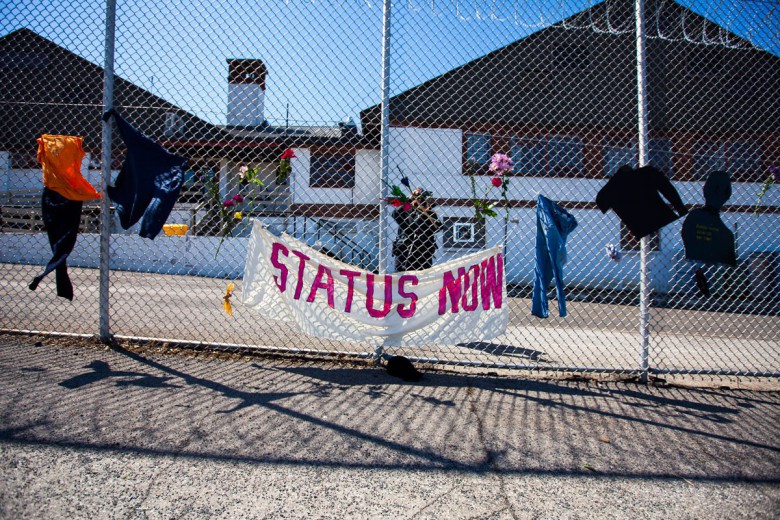
In late June, the extended Briarpatch family and the progressive community in Regina, SK lost Clare Powell, who died peacefully in his own home at the age of 81. Clare was not just a former editor and writer for Briarpatch during one of the publication’s most turbulent eras but also a mentor, volunteer, and Christmas partier at the ’Patch and a lifelong trade unionist, activist, radio broadcaster, and Prairie radical.
Briarpatch staff spent time with Clare just two weeks before his death when he pitched in – as usual – to stuff envelopes for our monthly renewals notices. He was waiting on foot surgery to be scheduled and had trouble walking, but he had still gotten into his old Buick sedan, driven over, and descended the steep staircase into the basement to join us in some menial work and easy laughter.
When he sat down beside me he told me he was happy to see that I’d “given the gears to the NDP” regarding their economic and environmental platform in the editorial of the previous issue. Clare was fond of saying that he’d been disappointed by many politicians in his life but he’d never been disappointed by Briarpatch. He asked us who the NDP MP was who had chickened out of our election roundtable. He was disappointed to learn who it was and immediately said, “Why didn’t you name her? I would’ve called her out by name.” He then gave us the scoop on the time a party hack had threatened to sue him for his criticism of NDP policy while he was editor.
In the mid 70s, before joining Briarpatch, Clare walked out on his communications position with Allan Blakeney’s Saskatchewan NDP government when it imposed wage controls on public sector workers, cut social programs, and opened up the North to uranium mining. He didn’t have another job lined up, but that didn’t matter so long as he could live with himself.
As Saskatchewan readers know, the Blakeney government of the 70s is often celebrated for its golden era legacy of Crown corporations like Potash Corporation of Saskatchewan and SaskOil (both long since privatized). Little is generally said about the presence of these extractive firms on Indigenous treaty land nor the proto-neoliberal turn taken by Blakeney in response to the economic crises of the 70s.
After leaving his NDP government post, Clare eventually found his way to Briarpatch, once telling me with a chuckle that “I think I was the only person who applied for the job.” In short order, the Blakeney government gutted the magazine by cutting all of its public funding in 1979, reasoning that Briarpatch had strayed too far from its mandate as a resource for low-income people. At the magazine, there was little doubt that the cuts came in response to the publication’s opposition to uranium mining, to anti-worker legislation, and to cutbacks. With two-thirds of the magazine’s revenue lost, and staff choosing to lay themselves off in the midst of frantic fundraising, Clare fired back in a Briarpatch editorial that the Blakeney government postured as a “champion of the downtrodden and disadvantaged” but in reality was simply content to “patch up and plaster over the most gaping inequalities in the capitalist system.”
Clare was an inspiration and model for many of us of what it means to make a principled life on the grassroots political left. He had a wry sense of humour, a love of inter-generational comradeship, and he could party like a hooligan. Over the years, Clare enjoyed some of the cheapest wines money can buy, and it was Clare who liked to quip that Briarpatch was “a champagne magazine on a beer budget.”
Like Clare, Briarpatch is not famous, but I tend to think that because it runs so deep and leans so fiercely toward the truths of the head, the heart, and the land, it is invaluable.
As we go to press, the federal NDP has recently purged two candidates, Morgan Wheeldon in Nova Scotia and Jerry Natanine in Nunavut, for having expressed sympathy toward Palestinians in the past on Facebook. In the case of Natanine, an Indigenous leader featured in a Briarpatch story on opposition to oil and gas development off Baffin Island (Sept/Oct 2014), the NDP has purged an Inuk candidate in the North simply for his sympathies with Indigenous peoples elsewhere. Meanwhile, NDP leadership has distanced itself from Toronto Centre candidate Linda McQuaig’s simple, factual statement that tarsands development must be curbed for Canada to meet its international climate responsibilities.
In May, I sat with Clare at a Canadian Labour Congress event organized to get out the vote for the NDP. Clare told me the NDP remained “the least worst option” and I suspect most readers of this publication would agree, with many currently in campaign mode for the party (while a couple of our most loyal subscribers are in fact NDP politicians). But for the approximately two-thirds of Briarpatch readers who identify as socialist, anarchist, or radical (according to our 2013 reader survey), there is no doubt that the world we seek requires more than an orange wave.






